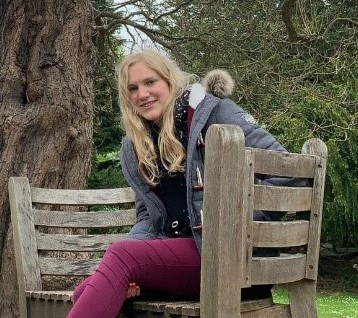Romany Whittall - Linguistics, Christ's College
I have just finished my first year of Linguistics at Christ’s College, Cambridge. I’m originally from Nottinghamshire in the East Midlands. Linguistics wasn’t something I have always wanted to study; most of my research into university was for English or Social Science courses. I found linguistics by accident, when I was writing an EPQ about politics and saw a socio-linguistic study into the language of politicians. This led me into lots of reading into the subject (and not all relevant to the EPQ…) until I knew I wanted to study it and started looking for courses. I’m really glad I did; I love linguistics and can’t imagine doing anything else.
One of the best things about the course is how broad it is: there are science-y aspects (how we produce sounds, how children learn language and its representation in the brain) and humanities aspects (the history of language, language attitudes and policy), which makes it an excellent subject for people (like me!) who are very indecisive. This breadth also means that almost any set of subjects at A-level can bring something to what you study: I did English, History, Maths and Further Maths, but doing languages, sciences, social sciences, or humanities are all helpful. Starting a subject that nobody on the course has every studied before was scary, but it meant everyone was on an equal footing, and we could use our different perspectives from A-level to guide each other.
Cambridge itself is a brilliant place to learn and live. The city itself is stunning, which makes for excellent walks whenever you need a break from studying. I am still discovering new places when I go out! One of the highlights of my year was a trip along the Cam with some friends by canoe; we got to see bits of lots of colleges that are much harder to see on foot. The resources in the Modern and Medieval Languages and Linguistics library are useful too, and it is a peaceful place to do work, though for first year most college libraries will generally have all the books you need. The lecturers and supervisors that I’ve had so far have all been really kind and helpful (and always very quick to get back by email!), which made getting help with any questions about the course easy even during distance learning. Because the course is quite small, it’s easy to get to know most people in your year; the linguistics students in my college and supervision groups were some of the first friends I made here.
My advice to a prospective student would be to come at the subject with an open mind. Some of my favourite bits of the course came as a real surprise to me; I didn’t anticipate I would enjoy the more technical aspects as much as I have. In terms of preparing for application, the best thing you can do is research into the subject in a way that’s enjoyable to you: YouTube videos, podcasts and entry-level books are a good way to start. Also, talk to other people about their thoughts on language. Look and see if you spot any patterns in your friends’ and family’s speech (though maybe don’t point it out to them!). One of the reasons linguistics is so fun to study is that everyone has some unique experience of it; you’ve basically been preparing from when you first learned to communicate.



